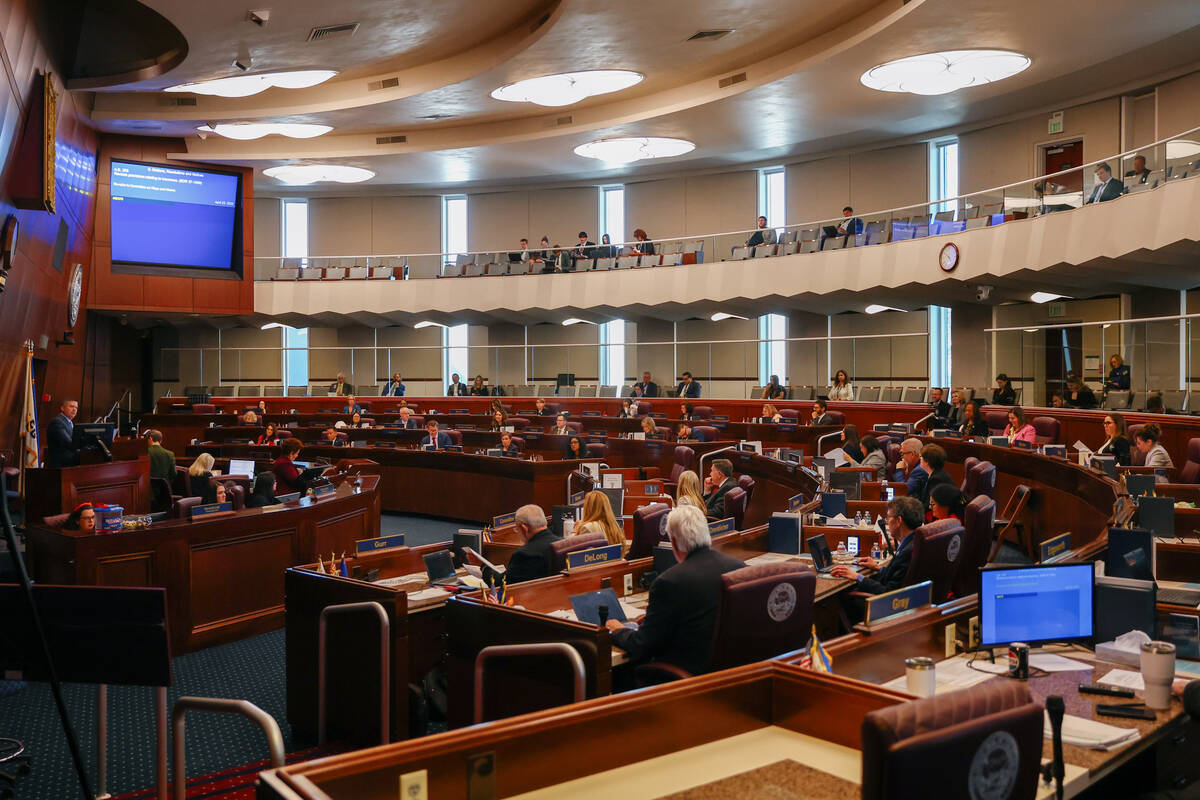Which bills died and which bills live on in the Nevada Legislature?
CARSON CITY — Hundreds of bills had passed through the Nevada Assembly and Senate by Tuesday, but a handful died — and more than 300 had their deliberations extended through waivers and exemptions that exclude them from major deadlines in the Legislature.
The first house passage deadline requires bills to be advanced by their house of origin to continue in the lawmaking process. While 281 of the 1,093 bills introduced this session died about a week earlier at the first committee passage deadline, only eight pieces of legislation failed to meet Tuesday night’s deadline.
Meanwhile, 333 bills did not need full Assembly or Senate consideration after legislative leaders waived the bills’ deadline requirements because of the legislation’s financial impact to the state.
But just because a bill failed a deadline does not mean it’s truly dead. Assembly and Senate leaders can bring them back into consideration through exemptions and waivers, or the bill’s language can be added to others through amendments.
Here’s a look at some of the bills that failed to get a vote by Tuesday:
Electrical vehicle charging stations in HOAs
Senate Bill 152, sponsored by Sen. James Ohrenschall, D-Las Vegas, would have allowed homeowners associations to install electric vehicle charging stations in common areas without the approval of HOA members.
Ohrenschall said more people would buy electric vehicles if they had charging stations installed in their place of residence. Homeowners associations opposed the bill, saying it overstepped the Legislature’s authority over homeowners associations and their members.
In a statement, Ohrenschall said he looks forward to work on electric vehicle charging legislation with environmental groups and homeowners associations.
“I believe that encouraging the use of electric vehicles is good for our environment as studies I’ve looked at state that driving an electric vehicle produces less greenhouse gasses than driving a gasoline powered vehicle even when the carbon footprint of electricity generation and battery manufacturing is factored into the study,” his statement said.
Solar energy support
Assembly Joint Resolution 12, sponsored by the Assembly Committee on Natural Resources, would have declared the Legislature’s support for certain principles of solar energy development in Nevada.
The resolution did not have a hearing.
Changing open meeting law
AB64 would have required governments to give speakers at least three minutes to comment during public comment periods, though an adopted amendment took out that portion.
It also would have allowed a public body to refuse to accept public comment relating to a contested case.
Exemptions abound
The fate of dozens of bills were delayed through exemptions. According to the Legislative Counsel Bureau, 67 Assembly bills and 55 Senate bills received waivers or exemptions between Friday and Tuesday — meaning more than 36 percent of exempted bills got their special status in the days leading to the deadline.
Exemptions give lawmakers extra time to consider a bill, especially if it has an impact on the state’s budget. Multiple sources say the state is bracing for weaker-than-expected revenues in the Economic Forum report, a state-mandated forecast that informs the Legislature’s budgeting process. That report comes out May 1.
Also, some lawmakers say the state’s budget could be significantly affected by the Trump administration, which has been cutting federal programs it says do not align with the Republican administration’s priorities. Nevada’s largest share of funding comes from the federal government at about 28 percent of the current biennium’s budget, according to the Kenny Guinn Center for Policy Priorities. The extent of those cuts’ impact on the state budget might not be known before the Legislature adjourns on June 2.
Below are a handful of the bills exempt from deadlines until the session ends.
Regulating artificial intelligence companies
SB199, sponsored by Sen. Dina Neal, D-North Las Vegas, would establish a framework regulating AI systems in Nevada. It would require AI companies to register with the Bureau of Consumer Protection within the Office of the Attorney General and develop policies to protect against bias, hate speech, bullying, misinformation, fraud and identity theft.
It also requires the Department of Employment, Training and Rehabilitation to submit an annual report to the governor and the Legislature on the number and kinds of jobs that have been lost due to the use of AI.
Limiting corporate investors in the housing market
SB391, also sponsored by Neal, would prohibit corporations from purchasing more than 100 single-family homes during one calendar year. The bill was first heard in the Senate Judiciary Committee on April 9 and re-referred to the Finance Committee on Monday.
A similar bill, SB395, was vetoed last session. Republican Gov. Joe Lombardo said in his veto message that the bill would arbitrarily limit the number of units a residential property lessor may acquire in one year and that it would probably worsen Nevada’s residential housing availability.
Strengthening animal cruelty penalties
AB381 — called “Reba’s Law” — would strengthen animal cruelty penalties. Assemblymember Melissa Hardy, R-Henderson, introduced the measure in honor of the English bulldog who died after being placed in a taped-shut plastic tote this summer.
The bill looked like it was going to die when it failed to pass out of committee, but the Assembly Judiciary Committee brought it back through an exemption last week.
Agriculture workers’ bill of rights
Sen. Edgar Flores, D-Las Vegas, introduced an “agriculture workers’ bill of rights” in SB172. The bill would establish rules around meal breaks, worker housing access and other workplace protections for most agricultural workers. The bill was first heard in the Senate Commerce and Labor Committee on March 3 and was re-referred to the Finance Committee on April 16.
Planning the aerospace industry
Sponsored by Assemblymember Gregory Koenig, R-Fallon, and Assemblymember Reuben D’Silva, D-Las Vegas, AB293 would create the Office of Aerospace. It would be responsible for developing and expanding state planning on air service, airspace and airport infrastructure. It would create a system for automated weather observation and implement a statewide network to support rural airports.
The bill comes at a time of recent national headlines about airplane and helicopter crashes and reduced federal funding for air traffic. It also follows an effort to build the Las Vegas Spaceport.
Contact Jessica Hill at jehill@reviewjournal.com and McKenna Ross at mross@reviewjournal.com. Follow @jess_hillyeah and @mckenna_ross_ on X.


















